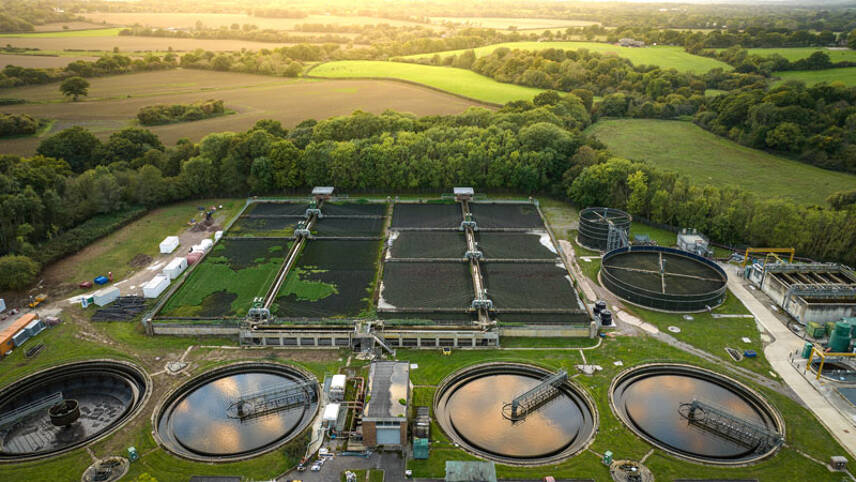Register for free and continue reading
Join our growing army of changemakers and get unlimited access to our premium content

Stock image: Water treatment works in Horsham, England
The call to action is being made of Environment Secretary Therese Coffey in a letter sent this week by the House of Lords Industry and Regulators Committee. This letter expresses a deep disappointment in the Government’s response to the Committee’s report on failures in water and sewage regulation, first published in March.
The letter calls the Government’s response “dismissively brief and complacent” and accuses the Department for the Environment, Food and Rural Affairs (Defra) of taking only “a cursory approach” to the “vexing problems” stemming from historic and continued under-investment in water infrastructure.
“We object to the apparent insinuation that our conclusions and recommendations were outside the scope of our inquiry, which appears to be an attempt to avoid parliamentary scrutiny,” the letter states.
The main issues raised in the original report were under-investment in water infrastructure and a lack of the provision of proper direction, staffing and powers to the bodies responsible for regulating the water sector. These include Ofwat and the Environment Agency.
On investment, the report stated that Defra’s pledge to raise £56bn from the private sector to reduce and improve storm overflow discharges was yet to be backed with a credible plan for delivery. It called for Ofwat to be given “strong, clear guidance” on how to make sure that water companies are preparing to meet this level of investment. The letter reiterates this call to action.
It states: “The need for investment in the sector is huge. However, despite the publication of a National Water Strategy, the Government has not clarified its view on how this should be paid for, beyond relying on the current regulatory system.
“The water industry’s proposed investment, if approved, still represents less than the annual amount required to meet the Government’s storm overflows targets, showing the need for greater investment. We do not share the confidence of the regulator and the Minister that the sector will be able to attract this investment under current regulatory arrangements.”
Who pays?
The letter notes that changing regulatory architecture to boost investment in stopping sewage spills, in addition to the need for investment in other areas to address a broader “cumulative backlog”, will likely result in higher water bills for customers.
It calls for Ofwat to be clearly directed on how trade-offs relating to affordability and long-term sustainability should be made, noting that a failure to invest now could store up water risks for the future as megatrends such as urbanisation and climate change continue. Summer 2022 was the driest in more than 30 years.
Industry experts told the Lords Committee of a need to strike a “balance between funding from today’s customers and future generations”, without “storing up problems for the future”.
The Committee’s proposed solution is a single social tariff. Some water companies already offer social tariffs, but Lords heard evidence that the amount of discount varied widely based on which water company customers used. Customers cannot switch water companies as they can energy suppliers, so the Lords were told of a “postcode lottery”.
Ministers have stated that Defra will consider standardising tariffs and setting universal eligibility criteria. The Lords Committee believes this would not be sufficient, amounting to optional guidance.
“Having heard evidence that it is now too late to introduce a single social tariff before the next Price Review, we urge the Government to announce its proposals on social tariffs as soon as possible,” the letter states.
Defra response
A Defra spokesperson said that while the Department “agrees that more needs to be done” to prevent storm overflows, it “firmly disagrees” with the conclusions made by the Committee.
They said: “We are delivering increased investment, stronger regulation, and tougher enforcement right across the sector. This includes being the first government to set ambitious targets for water companies to address storm overflows, which the High Court has ruled go even further than existing law.
“We are introducing unlimited penalties for polluters, driving the largest infrastructure programme in water company history, and have set clear expectations for water companies to deliver the changes that we all want to see.”
The UK’s post-Brexit environment watchdog stated earlier this month that water regulator Ofwat, plus factions of the Government, may have flouted environmental laws by not properly regulating sewage overflows.
Defra has stated that it does not agree with the Office for Environmental Protection’s initial interpretations of environmental law. Nonetheless, it is working with the watchdog as its inquiry continues.


Please login or Register to leave a comment.